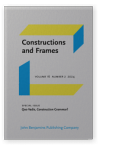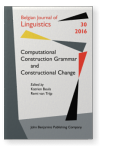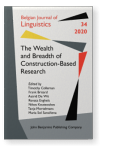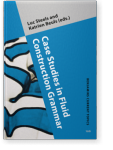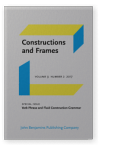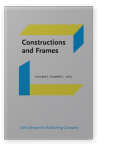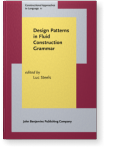Remi van Trijp
List of John Benjamins publications for which Remi van Trijp plays a role.
Journal
Title
Computational Construction Grammar and Constructional Change
Edited by Katrien Beuls and Remi van Trijp
[Belgian Journal of Linguistics, 30] 2016. v, 286 pp.
Subjects Theoretical linguistics
2024 Nostalgia for the future of Construction Grammar Quo Vadis, Construction Grammar?, Boas, Hans C., Jaakko Leino and Benjamin Lyngfelt (eds.), pp. 311–345 | Article
Construction Grammar is a nomadic family of theoretical approaches whose members are constantly moving in various directions. The diversity in construction-based approaches is a clear sign of a thriving and tolerant research community, but it also risks muddying the waters, leading to potential… read more
2020 Making good on a promise: Multidimensional constructions The Wealth and Breadth of Construction-Based Research, Colleman, Timothy, Frank Brisard, Astrid De Wit, Renata Enghels, Nikos Koutsoukos, Tanja Mortelmans and María Sol Sansiñena (eds.), pp. 357–370 | Article
Construction Grammar was founded on the promise of maximal empirical coverage without compromising on formal precision. Its main claim is that all linguistic knowledge can be represented as constructions, similar to the notion of constructions from traditional grammars. As such, Construction… read more
2019 How a Construction Grammar account solves the auxiliary controversy Case Studies in Fluid Construction Grammar: The verb phrase, Steels, Luc and Katrien Beuls (eds.), pp. 79–104 | Chapter
The English auxiliaries have been a matter of dispute for decades with two
opposing views: one analysis treats them as main verbs that take a VP
complement; the other considers them as feature carriers. Proponents of both
approaches have convincingly pointed out each other’s weaknesses without… read more
2017 How a Construction Grammar account solves the auxiliary controversy Verb Phrase and Fluid Construction Grammar, Steels, Luc and Katrien Beuls (eds.), pp. 251–277 | Article
The English auxiliaries have been a matter of dispute for decades with two opposing views: one analysis treats them as main verbs that take a VP complement; the other considers them as feature carriers. Proponents of both approaches have convincingly pointed out each other’s weaknesses without… read more
2016 Computational construction grammar and constructional change Computational Construction Grammar and Constructional Change, Beuls, Katrien and Remi van Trijp (eds.), pp. 1–13 | Article
2016 Chopping down the syntax tree: What constructions can do instead Computational Construction Grammar and Constructional Change, Beuls, Katrien and Remi van Trijp (eds.), pp. 15–38 | Article
Word order, argument structure and unbounded dependencies are among the most important topics in linguistics because they touch upon the core of the syntax-semantics interface. One question is whether “marked” word order patterns, such as The man I talked to vs. I talked to the man, require… read more
2013 A comparison between Fluid Construction Grammar and Sign-Based Construction Grammar Constructions and Frames 5:1, pp. 88–116 | Article
Construction Grammar has reached a stage of maturity where many researchers are looking for an explicit formal grounding of their work. Recently, there have been exciting developments to cater for this demand, most notably in Sign-Based Construction Grammar (SBCG) and Fluid Construction Grammar… read more
2012 The evolution of case systems for marking event structure Experiments in Cultural Language Evolution, Steels, Luc (ed.), pp. 169–205 | Article
Case has fascinated linguists for centuries without however revealing its most important secrets. This paper offers
operational explanations for case through language game experiments in which autonomous
agents describe real-world events to each other. The experiments demonstrate (a) why a… read more
2011 How to make construction grammars fluid and robust Design Patterns in Fluid Construction Grammar, Steels, Luc (ed.), pp. 301–330 | Article
Natural languages are fluid. New conventions may arise and there is never absolute consensus in a population. How can human language users nevertheless have such a high rate of communicative success? And how do they deal with the incomplete sentences, false starts, errors and noise that is common… read more
2011 Feature matrices and agreement: A case study for German case Design Patterns in Fluid Construction Grammar, Steels, Luc (ed.), pp. 205–236 | Article
This paper illustrates the use of ‘feature matrices’, a technique for handling ambiguity and feature indeterminacy in feature structure grammars using unification as the single mechanism for processing. Both phenomena involve forms that can be mapped onto multiple, often conflicting values. This… read more
2011 A design pattern for argument structure constructions Design Patterns in Fluid Construction Grammar, Steels, Luc (ed.), pp. 115–146 | Article
This paper presents a design pattern for handling argument structure and offers a concrete operationalization of this pattern in Fluid Construction Grammar. Argument structure concerns the mapping between ‘participant structure’ (who did what to whom) and instances of ‘argument realization’ (the… read more
